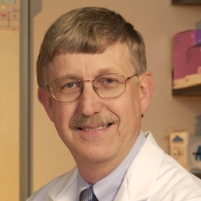Director of the National Institutes of Health: Who is Francis Collins?
Monday, January 18, 2010

Francis S. Collins brings one of the more eclectic, and highly regarded, profiles to the Obama administration as director of the National Institutes of Health (NIH). A leading figure in the completion of the Human Genome Project, which is considered one of the most important scientific accomplishments of our time, Collins brings a wealth of scientific credentials to the post. He also possesses a religious perspective that has rubbed some of his counterparts the wrong way, along with a deep love for motorcycles and rock music. He was confirmed by the Senate August 7, 2009.
Born on April 14, 1950, Collins grew up on a small farm in Virginia’s Shenandoah Valley along with his three brothers. His father taught at a nearby women’s college when not tending to the farm. His mother, a playwright, home schooled Collins until the sixth grade.
After graduating from Robert E. Lee High School at age 16, Collins enrolled at the University of Virginia, where he focused more on chemistry and physics than biology. He earned a Bachelor of Science in chemistry in 1970, and then attended graduate school at Yale University, attaining a PhD in physical chemistry in 1974.
While at Yale, he became fascinated with molecular biology and genetics, prompting him to attend medical school at the University of North Carolina at Chapel Hill. He earned his MD in 1977. This time of his life was also marked by a growing fascination with spirituality, thanks to the writings of C.S. Lewis. Although raised by parents who were not particularly religious, Collins developed a strong interest in religion, and eventually he became an evangelical Christian.
Collins performed his residency in internal medicine at North Carolina Memorial Hospital in Chapel Hill from 1978 to 1981, before returning to Yale and being named a Fellow in Human Genetics (1981-1984). It was then that he developed innovative methods of crossing large stretches of DNA to identify disease genes.
In 1984, he joined the faculty at the University of Michigan and eventually was named a Professor of Internal Medicine and Human Genetics. He continued to perform genetic research and develop “positional cloning,” a technique later adopted by other researchers.
Together with Lap-Chee Tsui and Jack Riordan of the Hospital for Sick Children in Toronto, Collins’ research team identified the gene for cystic fibrosis in 1989. This achievement was followed by the identification of the neurofibromatosis gene in 1990 and the defective gene that causes Huntington’s disease in 1993.
That same year, Collins took over the leadership of the government’s Human Genome Project as director of the National Center for Human Genome Research (later renamed the National Human Genome Research Institute, (NHGRI). He oversaw the International Human Genome Sequencing Consortium, and the following year, he founded the center’s Division of Intramural Research (DIR), which eventually became a premier research center studying human genetics.
Throughout the rest of the 1990s, Collins’ team strove to map the human genome, and in 2000, he shared the spotlight with rival scientist Craig Venter as part of President Bill Clinton’s celebratory announcement that a DNA blueprint was finally available to mankind.
In 2006 Collins published the book, The Language of God: A Scientist Presents Evidence for Belief. His outspokenness on religion has resulted in public arguments with other scientists who don’t share his views mixing science and spirituality.
Collins retired from the NHGRI in May 2008, although he continued to do research on a volunteer basis.
Outside of his work, Collins loves to play the guitar and ride motorcycles. While directing the NHGRI, he formed a rock band, The Directors, with other scientists working for the NIH.
-Noel Brinkerhoff
Official Biography (National Institutes of Health)
Francis Collins Biography (National Human Genome Research Institute)
Cracking the Code of Life (Academy of Achievement)
Creation or Evolution? Yes! (Interview by Stan Guthrie, Christianity Today)
National Institutes of Health (AllGov)
- Top Stories
- Unusual News
- Where is the Money Going?
- Controversies
- U.S. and the World
- Appointments and Resignations
- Latest News
- Trump Orders ICE and Border Patrol to Kill More Protestors
- Trump Renames National Football League National Trump League
- Trump to Stop Deportations If…
- Trump Denounces World Series
- What If China Invaded the United States?






Comments